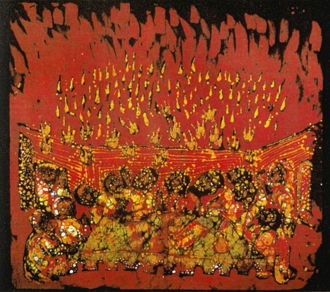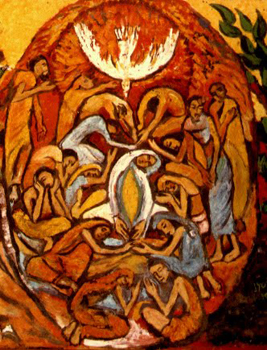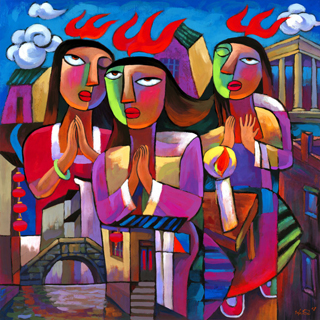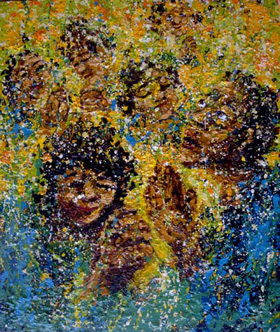For Sunday May 23, 2021
Lectionary Readings (Revised Common Lectionary, Year B)
Acts 2:1-21 or Ezekiel 37:1-14
Psalm 104:24-35
Romans 8:22-27
John 15:26-27; 16:4b-15
What images and actions do you associate with the Holy Spirit? Does the third person of the Trinity make you think of doves? Wind? Fire? Oil? When you anticipate the Spirit’s activity in the world, do you imagine people speaking in tongues? Confessing their sins? Discerning new callings? Preaching with renewed vigor?
What about communicating across differences of language, culture, tribe, ethnicity, age, gender, politics, and creed? What about building bridges of love and healing across ancient divides? What about discovering that the stranger is your brother? Your sister?
This week, we celebrate Pentecost, the coming of the Holy Spirit by fire, wind, and word. Pentecost — from the Greek pentekostos, meaning "fiftieth," was a Jewish festival celebrating the spring harvest. In the New Testament story Luke tells, the Spirit descended on 120 believers in Jerusalem on the fiftieth day after Jesus's resurrection. The Spirit empowered them to testify to Jesus’s impact on their lives, emboldened the apostle Peter to preach to a bewildered crowd of skeptics, and drew three thousand converts to the fledgling faith in one day. For Christians, Pentecost marks the birthday of the church.
 |
By any stretch of the imagination, it's a fabulous story, full of riveting details. Tongues of fire. Rushing winds. Accusations of drunkenness. Mass baptism. It's easy to get lost in the noise and the spectacle. But here’s the detail that stands out to me as the searingly relevant one for our time and place: "All of them were filled with the Holy Spirit and began to speak in other languages, as the Spirit gave them ability." "At this sound the crowd gathered and was bewildered, because each one heard them speaking in the native language of each."
As Christians, we place great stock in language. In words. Like our Jewish and Muslim brothers and sisters, we are a People of the Book. We love the creation stories of Genesis, in which God births the very cosmos into existence by speaking: "And God said." "In the beginning was the Word," we read in John's dazzling poem about the Incarnation. On Sunday mornings, we profess our faith in the languages of liturgy, creed, prayer, and music. In short, we believe that language has power. Words make worlds. And unmake them, too.
If this is true, then what does the Holy Spirit’s activity on Pentecost signify? Have we grasped the import of what the Spirit did — what the Spirit insisted on — at the inaugural moment of the church? What can we learn from the fact that the Spirit led with translation?
If you are bilingual, then you know that there is nothing easy about substituting one language for another. Languages are intricate and messy. They carry the full weight of their respective cultures, histories, psychologies, and spiritualities. To attempt one language instead of another is to make oneself a learner, a servant, a supplicant. It is an act of exploration and of hospitality. To speak across barriers of race, ethnicity, gender, religion, culture, or politics is to challenge stereotypes and risk ridicule. It is a brave and disorienting act. A risky act.
But this is what the Holy Spirit required of Christ's frightened disciples on the birthday of the church. Essentially, she told them: Stop huddling in what you call safety. Throw open your windows and doors. Feel the pressure of my hand against your backs, pour yourselves into the streets you've come to fear, and speak! Don't you understand? Silence is no longer an option. You are on fire!
 |
What I love about the first Pentecost story is that it required surrender and humility on both sides. Those who spoke had to brave languages beyond their comfort zones. They had to risk vulnerability in the face of difference, and do so with no guarantee of welcome. They had to trust that no matter how awkward, inadequate, or silly they felt, the words bubbling up inside of them — new words, strange words, scary words — were nevertheless essential words — words precisely ordained for the time and place they occupied.
Meanwhile, the crowd who listened had to take risks as well. They had to suspend disbelief, drop their cherished defenses, and opt for curiosity and wonder instead of fear and contempt. They had to widen their circles, and welcome strangers with accents into their midst.
Not all of them managed it — some sneered because they couldn't bear to be bewildered, to have their neat categories of belonging and exclusion challenged. Instead, like their ancestors at Babel, who scattered at the first sign of difference, they retreated into denial: "Nothing new is happening here. This isn't God. These are fools who've had too much to drink."
But even in that atmosphere of suspicion and cynicism, some people spoke, and some people listened, and into those astonishing exchanges, God breathed fresh life.
The bottom line is, something happens when we speak each other's languages. We experience the limits of our own words and perspectives. We learn curiosity. We discover that God's "great deeds" are far too nuanced for a single tongue, a single fluency.
Of course I’m stating the obvious when I say: Pentecost is a story for our time. We live in a world where words have become toxic, where the languages of our cherished "isms" threaten to divide and destroy us. The troubles of our day are global, civilizational, catastrophic. If we don't learn the art of speaking across the borders that separate us, we will burn ourselves down to ash.
 |
As I type these words, violence is intensifying across the Israeli-Palestinian divide. Children are dying, landscapes are going up in smoke, and chaos governs the streets. Closer to home, the United States is in a state of political and cultural gridlock so fierce, we seem to have no capacity to communicate across our differences. The consequences, whether they have to do with the Covid pandemic, climate change, racial justice, or economic disparity, are too numerous to count. For many of us, the temptation to retreat into our enclaves is especially strong right now. We can’t see outside of our social media bubbles. We’ve lost faith in the possibility of genuine dialogue. Our faith is faltering.
But this is precisely why we need Pentecost. What mattered on that first birthday of the church was not the rhetorical skills and the religious acumen of the disciples. What mattered is that they followed Jesus’s instruction to stay in one place, pray without ceasing, and wait for the Holy Spirit to come with power and do a new thing — both in them and through them. What mattered was that the disciples — bumbling and clueless as they so often were — obeyed the prompting of the Spirit and allowed themselves to be transformed by the wind, the fire, the breath, and the tongues of God. Everything else followed from that.
There is no way to overstate how much we need to gather as God’s people right now and ask the Holy Spirit to instruct us, shape us, remake us, and commission us. We need fresh languages of bridge-building. We need new words to rekindle love. We need the wind and fire of God to challenge our complacencies, reset our priorities, ease our anxieties, and move us out.
 |
It is no small thing that the Holy Spirit loosened tongues to break down barriers on the birthday of the church. In the face of impossible difference, God compelled God’s people to engage. From Day One, the call was to press in, linger, listen, and speak.
Because here's the thing: no matter how passionately I disagree with your opinions and beliefs, I cannot disagree with your experience. Once I have learned to hear and speak your story in the words that matter most to you, then I have stakes I never had before. I can no longer thrive at your expense. I can no longer make you my Other. I can no longer abandon you.
At my church, we respond to Sunday morning Scripture readings with these words: "Hear what the Spirit is saying to God's people." Can we hear it? Can we dare to hear what the Spirit is saying? Stop huddling. Stop hesitating. Speak. The Spirit has come, and silence is no longer an option. You are on fire.
Debie Thomas: debie.thomas1@gmail.com
Image credits: (1–4) Art & Theology.





